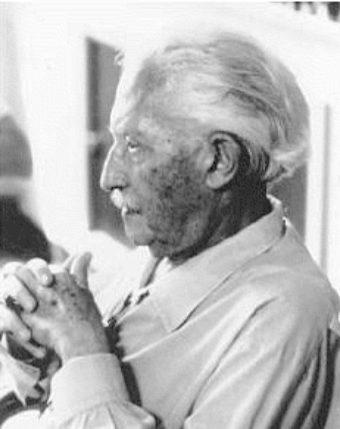2.3: Erikson and Psychosocial Theory
- Page ID
- 70804
Now, let's turn to a less controversial psychodynamic theorist, the father of developmental psychology, Erik Erikson.
The Ego Rules
Erik Erikson (1902‐1994) was a student of Freud’s and expanded on his theory of psychosexual development by emphasizing the importance of culture in parenting practices and motivations and adding three stages of adult development (Erikson, 1950; 1968). He believed that we are aware of what motivates us throughout life and the ego has greater importance in guiding our actions than does the Id.

We make conscious choices in life and these choices focus on meeting certain social and cultural needs rather than purely biological ones. Humans are motivated, for instance, by the need to feel that the world is a trustworthy place, that we are capable individuals, that we can make a contribution to society, and that we have lived a meaningful life. These are all psychosocial problems. Erikson divided the life span into eight stages. In each stage, we have a major psychosocial task to accomplish or crisis to overcome. Erikson believed that our personality continues to take shape throughout our life span as we face these challenges in living. We will discuss each of these stages in length as we explore each period of the life span, but here is a brief overview.
Psychosocial Stages
- Trust vs. mistrust (0‐1): the infant must have basic needs met in a consistent way in order to feel that the world is a trustworthy place.
- Autonomy vs. shame and doubt (1‐2): mobile toddlers have newfound freedom they like to exercise and by being allowed to do so, they learn some basic independence.
- Initiative vs. Guilt (3‐5): preschoolers like to initiate activities and emphasize doing things "all by myself".
- Industry vs. inferiority (6‐11): school aged children focus on accomplishments and begin making comparisons between themselves and their classmates.
- Identity vs. role confusion (adolescence): teenagers are trying to gain a sense of identity as they experiment with various roles, beliefs, and ideas.
- Intimacy vs. Isolation (young adulthood): in our 20s and 30s we are making some of our first long‐term commitments in intimate relationships.
- Generativity vs. stagnation (middle adulthood): the 40s through the early 60s we focus on being productive at work and home and are motivated by wanting to feel that we've made a contribution to society.
- Integrity vs. Despair (late adulthood): we look back on our lives and hope to like what we see‐that we have lived well and have a sense of integrity because we lived according to our beliefs.
These eight stages form a foundation for discussions on emotional and social development during the life span. Keep in mind, however, that these stages or crises can occur more than once. For instance, a person may struggle with a lack of trust beyond infancy under certain circumstances. Erikson’s theory has been criticized for focusing so heavily on stages and assuming that the completion of one stage is prerequisite for the next crisis of development. His theory also focuses on the social expectations that are found in certain cultures, but not in all. For instance, the idea that adolescence is a time of searching for identity might translate well in the middle‐class culture of the United States, but not as well in cultures where the transition into adulthood coincides with puberty through rites of passage and where adult roles offer fewer choices.
How do we act? Exploring behavior
Learning theories focus on how we respond to events or stimuli rather than emphasizing what motivates our actions. These theories provide an explanation of how experience can change what we are capable of doing or feeling.
Classical Conditioning and Emotional Responses
Classical Conditioning theory helps us to understand how our responses to one situation become attached to new situations. For example, a smell might remind us of a time when we were a kid (elementary school cafeterias smell like milk and mildew!). If you went to a new cafeteria with the same smell, it might evoke feelings you had when you were in school. Or a song on the radio might remind you of a memorable evening you spent with your first true love. Or, if you hear your entire name (John Wilmington Brewer, for instance) called as you walk across the stage to get your diploma and it makes you tense because it reminds you of how your father used to use your full name when he was mad at you; you've been classically conditioned!
Classical conditioning explains how we develop many of our emotional responses to people or events or our "gut level" reactions to situations. New situations may bring about an old response because the two have become connected. Attachments form in this way. Addictions are affected by classical conditioning, as anyone who's tried to quit smoking can tell you. When you try to quit, everything that was associated with smoking makes you crave a cigarette.

